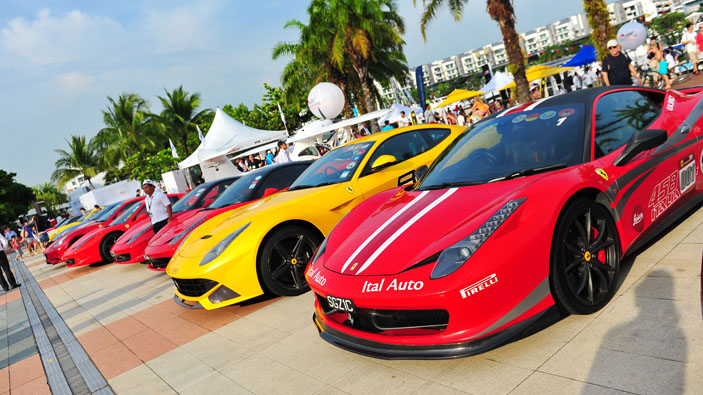AT THE recent annual convention of the People Action’s Party, Prime Minister Lee Hsien Loong said that the Singapore government will be raising its taxes as its spending on investments and social services grows.
Economists now expect a hike in the goods and services tax (GST) from the current 7% to be implemented.
PM Lee’s comments caused a stir in social media that has yet to subside as many people in Singapore are already contending with a high cost of living, high property prices and low disposable incomes. A GST hike will put more pressure on Singapore households, especially lower-income ones.
Several ideas have been put forward on social media and alternative news sites as to how the government can raise additional revenues without resorting to raising taxes for Singaporeans. These include cutting government salaries, reintroducing estate duties, more land sales and implementing additional taxes on the ownership of multiple passenger vehicles in households.
None of these are likely to be implemented.
Cause And Effect
A cut in government salaries is a non-starter because it will be an indirect admission that they are too high in the first place.
Meanwhile, reintroducing estate duties will likely see an outflow of wealth from the country as people seek lower tax bases. This may, in turn, put downward pressure on the Singapore dollar.
Land sales are more of a possibility but flows will be lumpy, unsustainable and are subject to demand and prevailing property market conditions.

Implementing additional taxes for ownership of multiple passenger vehicles in households go against Singapore’s long-standing principle of meritocracy. That is, people should not be penalised for succeeding within the Singapore system and spending on their big-ticket toys.
Still, for a country that has been innovative in extracting rents from citizens through channels like Electronic Road Pricing (ERP), Certificates of Entitlement (COEs) and contributions to the Central Provident Fund that are becoming increasingly difficult to withdraw due to constant tinkering, tax hikes seem a blunt tool.
Harvesting Low Hanging Fruit
Let’s tackle the issue from another angle. First, let’s analyse what PM Lee said in the convention. He noted that raising taxes in Singapore is “not a matter of whether, but when”, but the government will explain what the money is needed for and how it will benefit everyone.
This is a worrying statement because it suggests that the government is bereft of ideas, and always has to rely on the lowest hanging fruit, namely locals, to raise revenues.
After more than 50 years in the business of governing the country, you would think that the government would have acquired enough knowledge to seek out and use alternative channels for raising revenues that have nothing to do with locals who, by the way, continue to contribute to the government’s coffers through a variety of channels.
To add salt to the wounds, PM Lee expects that the government’s explanation on what the money is needed for and how it will benefit everyone will be a mitigating factor. He could, however, be right on that score as Singaporeans have often shown that they are more forgiving and understanding of their government than most.
Click on www.storm.sg/views for more opinion editorials on a variety of subjects.
Struggling With A Changing Landscape
Perhaps the problem lies in the complexity of the socio-economic landscape that has been developed in Singapore over the years. It is a landscape that needs constant tinkering, spending and upgrading.
Aren’t there other options for raising revenues that can incorporate the weeding out of some of these complexities?
For example, does Singapore really need to expand Changi airport when airports in cities like Bangkok, Kuala Lumpur and Jakarta are doing the same?

It just seems like a waste of resources to expand airport capacity when everyone around you is doing so, too. Further, for every shopping mall or man-made attraction that Singapore has, the neighbouring cities provide accessibility to numerous places of nature, culture, adventure and leisure.
Another initiative that doesn’t make sense is shifting Singapore’s port facilities up to Tuas and freeing land in the Tanjong Pagar and Keppel area for mixed property development. It is hard to see how more property development advances Singapore as a country and society in general. It is just more of the same stuff that Singaporeans have seen for decades. It also suggests that planners have spent too much time in Monaco.
You Might Also Like To Read:
Entitlement And Your Motoring Money
Squeeze For Info — Google Pixel 2 XL
Let’s end with this analogy: if the head of a household needs money for an extension at the back of his house, he will likely dip into his savings to pay for it. If he has no savings, he will probably look around for a short-term loan from a bank or finance company. If interest rates are too high, he may reconsider the need for the extension to his house. He will work out if he really needs the extension. One thing’s for sure, he isn’t likely to be asking his kids for the money.
If you extrapolate this to a country level, you would hope that the same sort of thinking is present in government. For savings, read reserves and for loans, read bond issuance. Singaporeans believe, based on reports, that the country’s reserves are immense, so the solution is straightforward. Dipping into reserves for healthcare and social spending is a great reason for accumulating said reserves. It would show that government policies have been working for everyone’s benefit over the years.
Image: Shutterstock





















Healthcare expenses will go up with an ageing population. And as an ageing person, I support the increased healthcare budget.
But a part of the equation that leads to the increased median age is: low childbirth.
With a population pyramid that is top-heavy with the ageing baby boomers, small-at-the-bottom partly due to the “stop at 2” policy in the 70s and 80s, we are now having a need for fewer schools.
No surprises that 28 schools will be combined into 14 schools next year.
With schools being shut (and car park charges introduced), wouldn’t the education ministry be saving millions each year? Or has that budget already gone into supporting the salary of another dual-minister-ministry?
Nice read! Some interesting points in this article. Regarding the ports, I think there may be some value with the shift to Tuas, particularly considering that our offshore and oil & gas hub is located there.
Come to think of it, the GOV issued bonds 2 years ago, I believe it was the SG50 bonds – so they technically took out a loan from the people? But what for? I am actually skeptical about the size of our reserves, maybe because there seems to be a lack of transparency there, but dipping into it for necessary government expenditure, on healthcare for example, seems to me like a no-brainer.